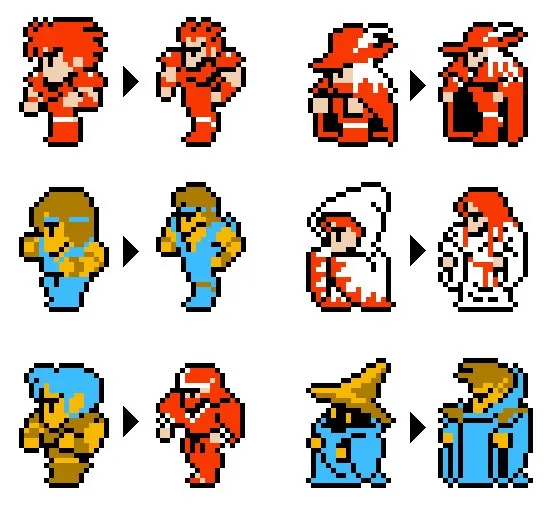
Castle of the Moon: Intro
Classic games made a lot of mistakes.
But they were also revolutionary at the time. It's hard to improve on a system that doesn't exist yet. The very first Final Fantasy was one such game. They did a lot of things in this game that died with the first iteration, but was it justified? What was done well and what was done poorly?
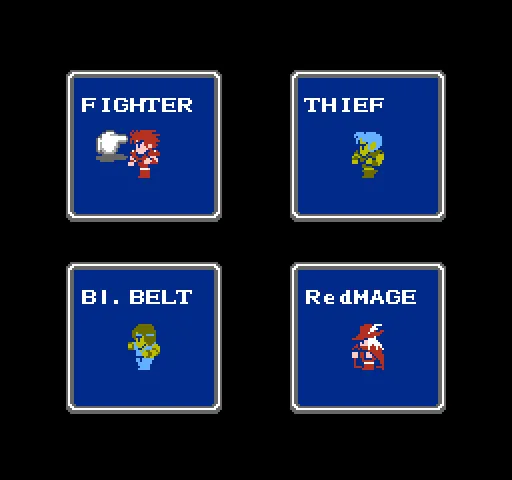
The insanity begins at literal character selection.
Right out of the gate when you begin the game you have to pick four Light Warriors to be in your party. This decision cannot be changed later unless you start the game over from the beginning... and if you choose poorly you're gonna have a bad time.
The fighter was by far the most valuable character in the party. If you didn't have one you were totally screwed as a newbie. Luckily by default the character selection screen puts the fighter front and center by default so most people would pick that class just automatically without really knowing how important he was.
The fighter can use almost all of the good weapons and armor and swing for more damage than anyone with superior STRength. The fighter's absorption/mitigation from armor was often so overpowered that when he got hit by lesser creatures the damage would get reduced to 1 or 2 points, especially in the early/mid game. Meanwhile all your other characters are getting slapped around for x10 or x20 that amount.
The fighter did not have to worry about running out of spells and would essentially just do basic attacks the entire game without ever getting exhausted. His free basic attack was often more powerful than expensive black magic that you'd run out of very quickly while in a dungeon. In the early game once you bought a silver sword for your fighter (4000 gil) he would start rampaging and you could progress pretty far without having to worry about dying. The fighter was wildly and embarrassingly overpowered in FF1.
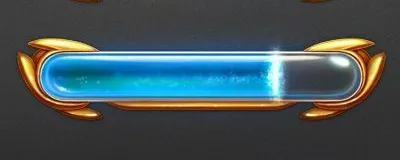
Blunder #2: no mana
In FF1 when your mages leveled up they'd often get a point of INTelligence, which would then give you access to a new rank of spells or allow you to cast more of the old rank (sometimes both). One of the reasons why the fighter was so stupidly overpowered is that mana did not exist and once you ran out of particular rank of spell you were completely screwed until you went back to town and rested in the inn. The only other way to get spells replenished was to buy a HOUSE and sleep on the world map, but you could not do this inside a dungeon and a HOUSE was wildly expensive in the early game to the point of never being worth buying until later.
The only potions in the game were ones that HEALed or PUREify poison or SOFTened being turned to stone. These potions also made spell casting less valuable because it was often cheaper to buy dozens of 75 gil PURE potions rather than spend 4000 on the white magic spell (which takes up one of three total slots and can only be used a couple times before resting is required). And this was a common theme in the game: mathematically certain spells were completely worthless and never worth getting or using, but new players had no way of knowing this and once you picked a spell to learn it could not be unlearned and you were stuck with it. Once that level-row had 3 spells you could not learn anymore and you had what you had. It was a very unforgiving mechanic.
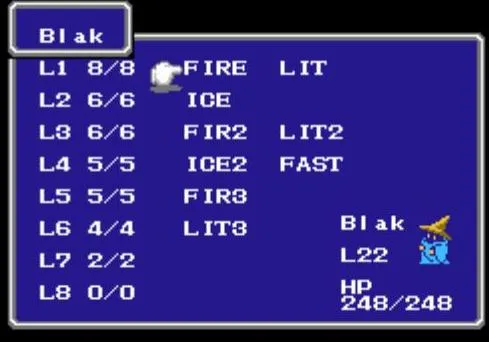

First playthrough:
I'm pretty sure the first time I ever played the game I picked a fighter/thief/white-mage/black-mage. It seemed like a solid pick as a ten year old, and it was alright... but the THIEF was a terrible class. Just awful. The THIEF's main stat was luck, and luck should have been good at getting critical strikes and such, but it was more used for simply running away... and running away was a bad strategy. So with a loadout like this it's just your fighter killing everything solo most of the time.
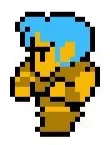
Having a THIEF in the party was good if you wanted to traverse a dungeon and rather than killing everything you found: you'd just run away real fast and make sure you could get through the entire thing without taking too much damage and loot all the chests and kill the boss.
The problem with this is that if you're running away from everything you aren't getting XP and leveling up, and you're not getting gil to buy new items, armor, and spells. And other classes were pretty good at running away as well. Also you could never run away from the toughest enemies, so sometimes you'd end up dying simply because you were trying to run away from something that was impossible to run away from. In subsequent games like FF3 they fixed this with a "can't run" message when you tried to run from a boss.
(and there was no way of knowing)
You have to remember that this game launched on December 18, 1987. There was no internet [as we know it]. There was no Google. There was no WIKI that you could lookup documentation. I found out so much stuff about this game within the last 5-10 years that I had no idea was a thing.
The difficult American version that I play has tons of bugs in it. There are many items and spells in the game that simply don't even work. There are many hidden bonuses in the game that you'd never know existed unless you actually looked at the source code. In retrospect it's actually quite annoying that the creators of the game thought that their UX was acceptable considering the era in which the game released.
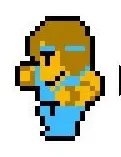
And then there's the blackbelt...
The idea of the BLACKBELT is pretty cool once you actually understand why he exists. Like the fighter he has no spells so he just does basic attacks... but he can't wear good armor, and he can't wield good weapons... so at first he seems completely worthless just like the THIEF. But then, one day, as a child, I accidentally took off his nunchaku weapon and and he swung with his fists for massive damage. I was so pissed and in disbelief that I was handicapping this character the entire game. I then took off his armor and realized he had better stats with no armor on at all!
So the BLACKBELT's purpose is to have a character in the party that starts the game extremely weak but by the end of the game he's the hardest hitting class in the group, and he does it all without any items. This makes him the lowest of the low maintenance, and you can use his weapons and armor slots as a bank for items that you want to carry around with you without equipping them. So he does have a purpose in theory, but the fighter is still superior in almost every way and having 2 fighters in your party is extremely overpowered. The ability to hand-me-down all your best gear from your main-tank to an off-tank is just too good.
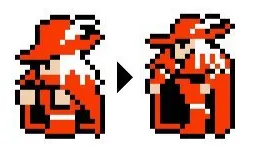
And so we come to the glorious red mage.
Obviously the red mage is my favorite class by far. In fact the last time I beat FF1 I picked 4 red mages just to see if I could do it. Not only did I complete the game with ease using a couple tricks but also I only wiped one time (damn you RNG Ice Cave). It was a pretty interesting challenge for sure. I beat this game once every 3-5 years for the nostalgia. The easiest loadout by far was 2 warriors and 2 red mages, but that's kind of boring.
Unlike the white and black mages, the red mage can actually wield a sword. This makes their melee attack exponentially more powerful than the other mages (who basically swing for 1 dmg unless they randomly crit). While their melee attack is nowhere near as good as the fighter they also have access to both white and black magic, which comes in pretty clutch in a lot of situations. Being able to heal and hard-counter elemental attack and melee attack with every character is pretty good, even if the melee is fairly sub-optimal.
The massive disadvantage of red mages is that they are expensive AF. In the early game you basically have to get all 4 of them equipped with a silver sword and buying spells for them to learn is quite expensive as well. It's also quite hard to carry any extra items around (like ZEUS gauntlets that allow the player to cast LIT2 for free) because red mages use all their armor slots. Still, they are fairly superior to the other mages just like the fighter is superior to the thief and blackbelt. More importantly: they aren't boring; having red mages was significantly more skill/knowledge/farm-based than other loadouts.
The mythical ribbon
There's a "helmet" in the game called the ribbon... I'm pretty sure on my first playthrough I threw these items away even though they are arguably the best-in-slot. Once you throw them away you can't get them back. The reason why they are so good is they give you huge immunity to spell damage and make you immune to perma-death... but when you equip them there is absolutely no indication of what they do... and they only give one armor point... you're just supposed to figure it out I guess.
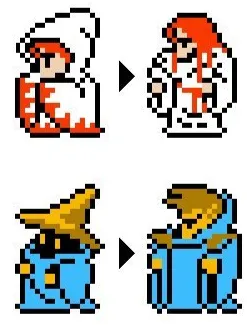
Mages seem good at first...
But the problems were endless. For example the white mage only gets a good healing spell on odd ranked levels (lvl 1 cure, lvl 3 cure2, lvl 5 cure3). We can see in the loadout below that the player did not get CUR3 at level 5... which is a massive blunder. The only reason to have the white mage is for the heals.
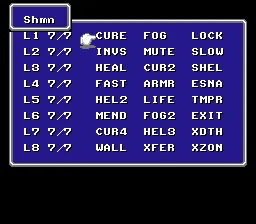
It's also quite tricky with the red mage as well. For example you definitely want CUR2 and FIR2 on a redmage, but both are level 3 spells... so every time you cast FIRE2 for AOE damage to kill the undead it means you just lost one of your good heals... which was wildly annoying. Cure3 and Fire3 were the same dynamic. Not having a mana/resource pool was quite bad UX.
Conclusion
In retrospect Final Fantasy [1] is an objectively bad game for a lot of very good reasons, but that's because it was the first of its kind and the developers had no idea what they were doing. Of course "mana pools" have existed since table-top roll-playing as far back as the 70s... so did they really have an excuse for that blunder? Maybe.
The one thing Final Fantasy did in the first game that you don't really see anymore is the ability to evolve classes into a better version of themselves. That's what I'll be discussing in the next post and how I'd like to apply it to the Castle of the Moon game design document.